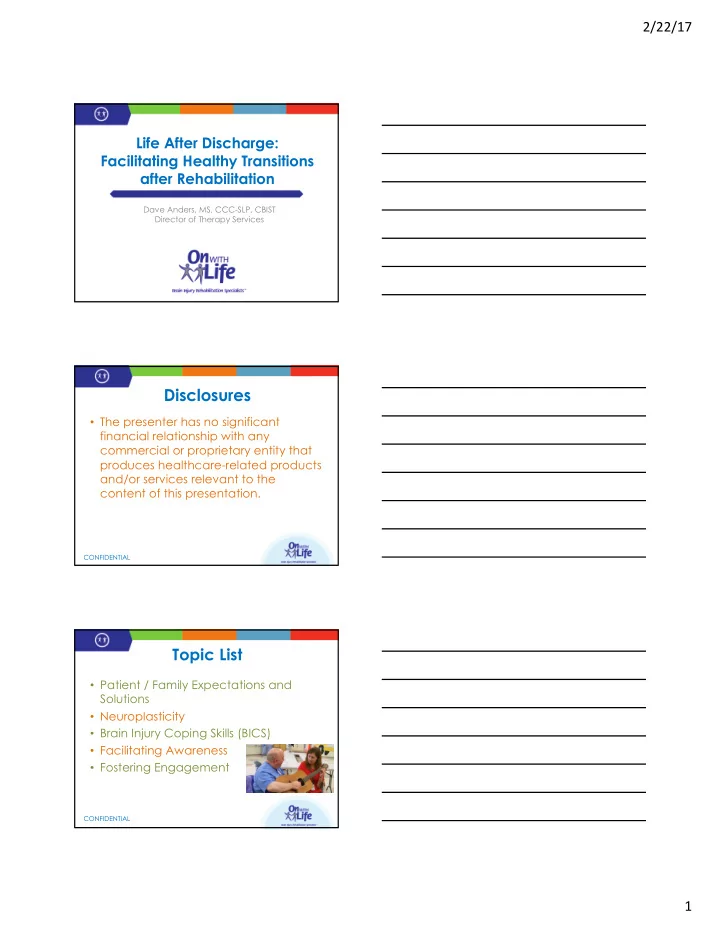

2/22/17 Life After Discharge: Facilitating Healthy Transitions after Rehabilitation Dave Anders, MS, CCC-SLP, CBIST Director of Therapy Services Disclosures • The presenter has no significant financial relationship with any commercial or proprietary entity that produces healthcare-related products and/or services relevant to the content of this presentation. CONFIDENTIAL Topic List • Patient / Family Expectations and Solutions • Neuroplasticity • Brain Injury Coping Skills (BICS) • Facilitating Awareness • Fostering Engagement CONFIDENTIAL 1
2/22/17 Aligning Patient / Family Expectations: • Brain injury affects the entire family • The caregiver’s needs are AS IMPORTANT AS that of the survivor • How families experience and adapt to changes in roles after brain injury differs. CONFIDENTIAL Common Family Themes in Post-Acute Transitions • Hopes for a rapid recovery • Rehabilitation will “fix” my loved one. • “Nobody ever told me this.” • Increased isolation and decreased social support • Physical and emotional exhaustion • Concerns of what to do next • Beginning awareness of real changes in the person • Guilt about absence from home and work • Financial concerns CONFIDENTIAL 10 Principles of Neuroplasticity 1. Use it or lose it 2. Use it and improve it 3. Specificity 4. Repetition matters 5. Intensity matters 6. Timing matters 7. Salience matters 8. Age matters 9. Transference 10. Interference CONFIDENTIAL 2
2/22/17 Brain Injury Coping Skills (BICS) Improved Improved psychosocial coping skills outcome Greater resources Increased social support Brain Injury Poor coping strategies Few resources Absence of social support Psychosocial deterioration CONFIDENTIAL Neurorehab…What’s the Difference? • Cognition…Cognition…Cognition! – Relearning – Adapting – Cueing – Facilitating – Developing Compensatory Strategies – Developing Community Supports CONFIDENTIAL Treating Deficit Awareness • What do we usually do? Why doesn’t it work? – Cue – Cue – Cue – Cue – Cue – Cue – Cue – Cue – Cue – Cue – Cue – Cue CONFIDENTIAL 3
2/22/17 Deficit Awareness…Practice Standard Predict-Perform Procedure: • 1. Therapist introduces a task. This can be purely paper and pencil, real, or simulated…along the gamut of task complexity. 2. PS is asked to: 1. Set a goal 2. Predict their performance 3. Anticipate and pre-plan for any anticipated types of errors or obstacles (i.e. are you going to need reminders or physical help with any aspect of this task?) 4. Choose a strategy to circumvent these difficulties 5. Assess the amount of assistance he/she will need to successfully complete the task 3. Following the above, the PS completes the task 4. Complete structured self-evaluation 5. Collaboration and comparison of perceived performance and reality 6. Record experiences, including tips or strategies to be successful next time CONFIDENTIAL TBI PBE Study…The Importance of Effort CONFIDENTIAL Engagement…the critical difference in a Survivor / Caregiver • How do you measure it in terms of competency development for caregivers? CONFIDENTIAL 4
Recommend
More recommend